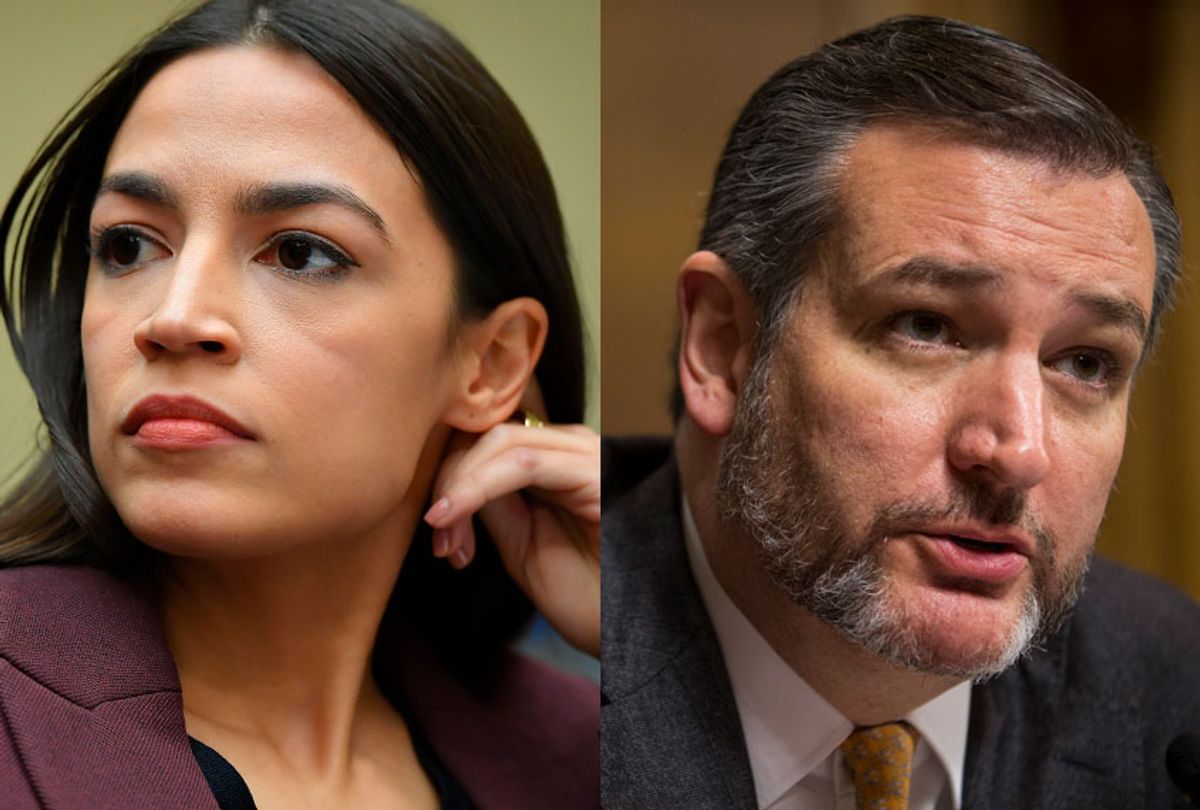In an unexpected congressional crossover episode, a new team of rivals has assembled. Rising progressive icon Rep. Alexandria Ocasio-Cortez, D-N.Y., and Tea Party mainstay Sen. Ted Cruz, R-Texas, pledged to work together to stop the revolving door through which lawmakers turn lobbyists. The unlikely pair came to a tentative deal on Twitter on Thursday.
It started when the freshman Democrat tweeted, "I don't think it should be legal at ALL to become a corporate lobbyist if you've served in Congress." She also linked to a study from the watchdog group Public Citizen that revealed that 60% of former legislators had taken jobs as lobbyists, including former Rep. Joseph Crowley, the high-ranking Democratic congressman she defeated in a primary last summer. More than a dozen former members of Congress have joined lobbying firms so far this year, although not all of them plan to register as lobbyists. Others have announced plans to start their own consulting firms.
Cruz, who has feuded with Ocasio-Cortez on Twitter before, tweeted back that he agreed, suggesting it might be “a chance for some bipartisan cooperation.”
“Here’s something I don’t say often: on this point, I AGREE with @AOC,” Cruz tweeted. “Indeed, I have long called for a LIFETIME BAN on former Members of Congress becoming lobbyists. The Swamp would hate it, but perhaps a chance for some bipartisan cooperation?”
Ocasio-Cortez seemed intrigued, suggesting she would be willing to sponsor a "clean bill" on the issue.
Politics does indeed make strange bedfellows, and this coalition kept growing. After the exchange between Cruz and Ocasio-Cortez, House Freedom Caucus member Rep. Chip Roy, R-Texas, and Sen. Brian Schatz of Hawaii, a progressive Democrat, also indicated their plans to support the bipartisan effort on Twitter.
Earlier on Thursday, Ocasio-Cortez touted bipartisan coalitions as a meaningful path for progressive change. After sharing a clip of Housing and Urban Development Secretary Ben Carson saying he agreed with her that people with criminal records should be able to get housing, Ocasio-Cortez tweeted: “So often, bipartisanship is marketed as: a) something only ‘centrist moderates’ are capable of, or b) giving up your principles to ’get things done.’”
“I couldn’t disagree more,” she said. “You don’t have to abandon your principles to agree. Being curious about other people’s values helps, too.”
Ocasio-Cortez’s style may remind political observers with long memories of the late Sen. Paul Wellstone, a progressive Democrat from Minnesota. Republican foes called him "embarrassingly liberal" and he campaigned in an old beat-up school bus. But inside the Beltway, Wellstone connected with his ideological opposite, right-wing Republican Sen. Jesse Helms of North Carolina, and together they got some things done.
Cruz, for his part, obviously knows that Ocasio-Cortez holds leverage; she is very popular and has a huge base of followers, while Cruz is anything but well-liked, even within the Republican caucus. Cruz can claim that he supports the lifetime ban on the Congress-to-lobbyist revolving door because he knows Senate Majority Leader Mitch McConnell will never allow any such bill to reach the floor. He'll never have to vote on any bill that pits him against his donors and thereby gets to have his cake, and eat it too. He can claim to have worked across the aisle with a liberal Democrat and suffer no real consequences.
Similar legislation has already been introduced by a bipartisan group of lawmakers, notably including presidential hopeful Sen. Elizabeth Warren, D-Mass. She introduced a bill that includes a lifetime ban on lobbying by former lawmakers, presidents and top executive branch appointees. Rep. Trey Hollingsworth, R-Ind., also introduced legislation in February that would ban former members of Congress from registering as lobbyists.
Former senators are currently banned from lobbying Congress for two years after leaving office; former representatives are banned for only one year. Former Senate Majority Leader Trent Lott, who’s now a top lobbyist, famously resigned from the Senate in 2007 just before Congress voted to extend the ban for senators from one year to two.



Shares